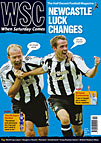 The Cross of St George may be everywhere but it’s not that long since it was mainly used by extremists – and, as Dan Turner explains, the BNP have stepped into a row at Oldham
The Cross of St George may be everywhere but it’s not that long since it was mainly used by extremists – and, as Dan Turner explains, the BNP have stepped into a row at Oldham
It takes a hell of a story these days to divert Oldham fans away from moaning about their team’s on-field woes. As the most expensively assembled squad of recent times at Boundary Park spent most of the autumn stumbling from one mediocre performance to another, the groans of dissatisfaction from the faithful grew and threatened to come to a head. But just as manager Ronnie Moore’s lump-it-and-pray tactics were leading even the most phlegmatic of Latics to question his position, along came the flag. And never has 18 square feet of material caused such a rumpus.
The story started on November 19, when a Cross of St George was unfurled by some Oldham fans at a league game at Brentford. Adorned with the words “Born in England, Live in England, Die in England”, the flag was taken down by Griffin Park stewards at half-time, apparently following complaints from home fans who saw the message as racist.
A full-scale controversy developed when the sides then met in the second round of the FA Cup on December 3 at Boundary Park. The flag made an appearance again and, at the end of a 1-1 draw, Brentford manager Martin Allen angrily complained, saying that black players in his team had been offended and that if he saw it at the replay he would burn it. This quickly became a very modern race row. Conventional wisdom has it that overt racism in English football has almost been eradicated, but that the prevailing brutal tone of the Seventies and Eighties has been replaced by a far more subtle form of prejudice. The story of the Oldham flag supported this theory as, for days on end, every party with a vested interest debated its meaning. Both clubs’ managers and boards got involved, as did official football websites, independent message boards, the Oldham Chronicle, the British National Party, the BBC, the Commission for Racial Equality and the Kick It Out campaign.
Broadly speaking, commentators fell into three categories. First there were those who had no problem with a St George’s flag at an English football ground, but saw the message on it as one clearly designed to provoke, offend and ostracise ethnic minorities – no matter which of the three “patriotic” criteria they fell foul of, if any. To this group, it was no coincidence that the flag was created by supporters from a town so recently riven by racial tension.
The second camp saw the whole furore as a “politically correct campaign” to undermine traditional English symbols. Some in this group made the broader point that, unlike the Welsh, the Irish and the Scots (and pretty much every other nation on the planet), the English can’t express a love of their country without being portrayed as fascists.
The third group saw the whole thing as a relatively trivial matter and spent about a fortnight shaking their heads, unable to believe that it had all turned into such a cause célèbre.
After the first Cup game, rumours circulated that the Oldham board had banned the flag. The club’s chief executive, Alan Hardy, denied there was any ban but added that the club had organised a meeting with the flag’s owners. On December 7, the club released a statement saying that they did not believe the flag to be racist, but that its owners were “concerned about all the publicity that had surrounded its use” and had volunteered not to use the flag in its current form.
End of story, you’d think. But then a message appeared on the BNP website urging people to turn up to the Cup replay with St George’s flags in a show of patriotism. Given the far right’s profile in Oldham just before and since the race riots of 2001 – BNP leader Nick Griffin got 16 per cent of the vote in the Oldham West constituency at that year’s general election and both his party and the National Front have tried to recruit among Latics fans before – there was serious concern that trouble might erupt and the town’s name would be dragged through the dirt once again.
Luckily, no such disturbances occurred and contributors to the independent Latics message board went back to slagging off Ronnie Moore’s tactics, berating the players for not earning their inflated wages and responding to fans of other clubs complaining about our away prices. But given the town’s history, few fans are naive enough to think that something similar won’t divert their attention in the future.
From WSC 228 February 2006. What was happening this month